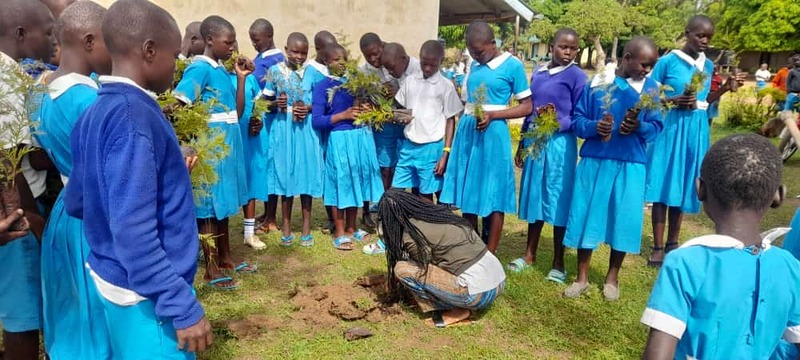PlantVillage Engages African Children as Climate Change Agents
Posted on
In African culture, children embody not only the prosperity and reputation of a family but also the transmission of essential values and traditions across generations. Sadly, the adverse impacts of climate change have shaken the stability of the African family institution, jeopardizing the well-being of children who face the risk of food insecurity and other basic necessities.
According to UNICEF, the Horn of Africa has witnessed a distressing surge in the number of children facing malnutrition, hunger, and thirst, with figures escalating by 40 percent from 7.5 million to 10 million between February and April.
Recognizing the urgency of the situation, PlantVillage, dedicated to assisting low-income families reliant on small-scale farming, has implemented strategies aimed at ensuring that the African child not only has access to food but also acquires knowledge and tools to address the climate change crisis.

Over the past six years, PlantVillage's Dream Team, a dynamic group of young individuals, has made a significant impact on thousands of children in families across six countries in Africa. Through food and income generated from farming, this initiative has provided nutrition, sustenance, and educational opportunities for these children.
PlantVillage's success lies in its adoption of various modern farming techniques and technologies that empower farmers and pastoralists in arid and semi-arid regions. These approaches include crop and livestock disease surveillance through the PlantVillage Nuru application, integrated pest management (IPM) strategies, and organic farming.
As part of its commitment to raising awareness and educating communities about climate change mitigation, the organization has engaged primary and secondary school children in Kenya and Tanzania through a program known as the Climate Change Clubs initiative.
Launched in mid-2022, this ambitious program has already seen more than 5,000 pupils and students from six counties in Kenya and regions in Tanzania form Climate Change Clubs. Club members actively participate in tree planting activities and subsequently educate fellow learners and their parents on the importance of tree-planting.

"We have managed to distribute 4,460 trees to Kenyan schools. The initiative has enabled children to learn and actively participate in creating resilient ecosystems that can withstand the impacts of climate change," says Eunice Cleophas, an agroforestry officer working in Bungoma County, Kenya.
Cleophas and other agroforestry officers often visit the clubs to monitor the growth of the trees and remind learners of the importance of maintaining the practice.

"We teach them that trees play a vital role in climate resilience and adaptation. They help combat soil erosion, regulate water cycles, and provide shade. Planting trees can help recharge groundwater and mitigate the effects of drought," Cleophas adds.
Beyond the Climate Change Clubs, the African child has gained exposure to using the technologies invented and advanced by PlantVillage, such as the PlantVillage Nuru application that assists farmers in detecting and controlling crop diseases using their smartphones.
Elinah Sultani, a lead farmer in Kilifi North Sub-County, Kenya, shared her 17-year-old daughter's instrumental role in educating her on smartphone usage and conducting surveys on cassava and maize crops.

"When I received the smartphone from PlantVillage in the year 2021, I lacked knowledge on how to use it. The extension officer had to train my daughter for one month on how to navigate the PlantVillage Nuru application," she said.
Ms. Sultani learned about surveying from her daughter three weeks before she could do it on her own.
With the healthy cassava she grew with the help of the PlantVillage Nuru application, Elinah’s daughter was able to complete secondary school with the profits she made from selling the produce and multiplying seedlings.
PlantVillage founder and director Dr. David Hughes believes that involving the African child in climate change mitigation is an idea meant to "accelerate the delivery of knowledge onto farms."
"It is the young brain that learns the quickest! Therefore, youth are critical to finding solutions," he said in a tweet dated September 19, 2022.
Written by Emmy Neema